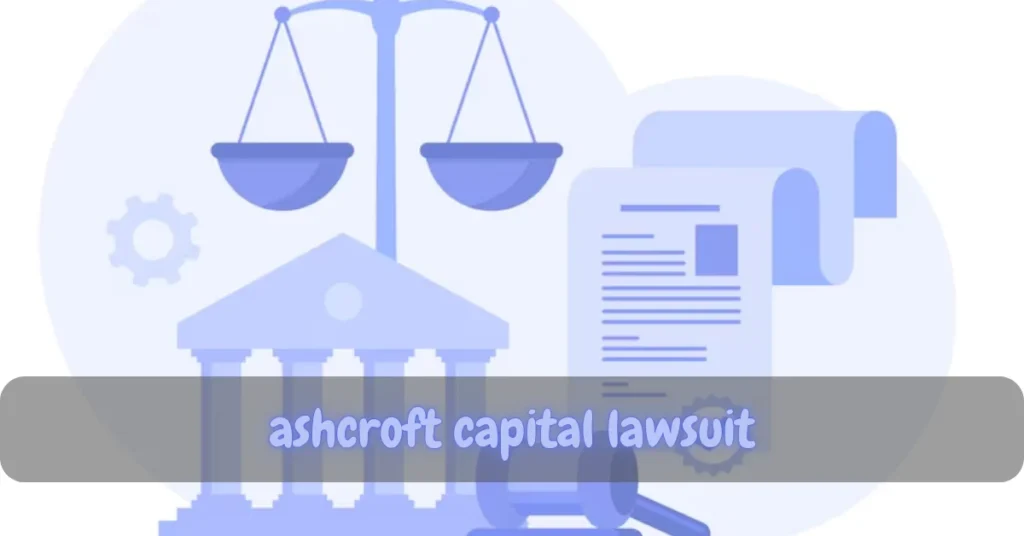📌 Introduction
The world of real estate investment can be full of promise… and pitfalls. One recent headline-grabber is the lawsuit against Ashcroft Capital, a firm known for its multifamily real estate syndications. If you’re an investor, this case isn’t just gossip — it’s a wake-up call. Let’s break it down so you know exactly what’s going on, why it matters, and how you can protect yourself.
🏢 What is Ashcroft Capital?
Ashcroft Capital is a real estate investment firm focused on acquiring, renovating, and operating large apartment communities across the United States. They’ve gained a reputation for their value-add multifamily strategy — basically, buying older apartment complexes, fixing them up, and then selling them at a profit.
⚖️ Overview of the Lawsuit
The lawsuit centers around investor accusations of mismanagement, lack of transparency, and possible financial misconduct. In essence, the investors are claiming they were misled — and now they want answers (and accountability).
💥 Why This Case Matters for Investors
It’s not just about one firm. This lawsuit raises bigger questions about how private equity real estate deals are run. Are they as transparent as they should be? What protections do investors really have? If you’re putting your hard-earned money into a syndication, you’ll want to pay attention.
🏗️ The Genesis of Ashcroft Capital
Company Background
Founded by Joe Fairless, Ashcroft Capital quickly rose to prominence in the real estate syndication world. Their pitch? Passive real estate investing made easy, targeting high-net-worth individuals and accredited investors.
Real Estate Investment Focus
Ashcroft zeroed in on high-growth markets — Texas, Florida, Georgia — buying Class B/C properties and turning them into Class A experiences (on paper, at least).
Key People Behind the Brand
Joe Fairless and his executive team often took the spotlight, with podcasts, blogs, and appearances promoting real estate investing. Their media presence helped build trust with thousands of followers and investors.
📂 The Lawsuit Unveiled
What Sparked the Legal Action?
It began when several investors alleged they weren’t receiving accurate financial updates or expected distributions. Upon digging, some claimed they found gaps in reporting and questionable financial decisions.
Alleged Misconduct and Investor Claims
The lawsuit alleges:
- Improper handling of investor funds
- Inflated projections
- Failure to disclose conflicts of interest
Timeline of Events
- Early Red Flags (2023) – Late payments and vague responses.
- Initial Complaints Filed (2024) – Formal legal notices submitted.
- Public Exposure (2025) – Media coverage pushes the issue into the spotlight.
⚠️ Legal Allegations Explained
Breach of Fiduciary Duty
A fiduciary is supposed to act in your best interest. Investors claim Ashcroft did the opposite by prioritizing firm profits over transparency and returns.
Misrepresentation and Omission of Facts
There are claims that ashcroft capital lawsuit withheld key data or presented an overly rosy financial picture during fundraising.
Conflicts of Interest
Some investors argue that related-party transactions (i.e., Ashcroft doing business with companies it also owns) weren’t clearly disclosed.
💬 Investor Reaction and Fallout
How the Investment Community Responded
The reactions? Mixed — and heated. While some still support the firm, others have pulled out their investments or formed coalitions for legal action.
Social Media and Online Forums
Platforms like BiggerPockets and Reddit lit up with discussions, warnings, and debates over what really went down.
Statements from Investor Groups
A few investor-led advocacy groups have demanded an independent audit and more legal oversight of similar firms moving forward.
📉 Risk and Real Estate Syndication
The Nature of Syndicated Investments
With syndications, you’re trusting someone else to manage your money. That trust comes with risks — especially when you don’t have a seat at the decision-making table.
Common Pitfalls and Oversights
- Overpromising returns
- Misunderstood fee structures
- Lack of liquidity and transparency
Why Due Diligence is Essential
Always ask: Who’s behind the project? What’s their track record? Is there a third-party audit?
🔍 Transparency in Private Equity Deals
Importance of Clear Reporting
Quarterly updates and open-book policies build trust. If your sponsor is dodging questions, that’s a red flag.
The Role of Third-Party Audits
Investors should push for third-party audits, especially in multi-million-dollar projects. It’s not paranoia — it’s protection.
🧾 Accountability in Investment Management
How Lawsuits Push for Better Standards
Yes, ashcroft capital lawsuitare messy. But they often lead to improved regulations and cleaner industry practices. They act as a reset button for transparency.
Lessons Learned from Past Industry Cases
From Bernie Madoff to other private equity debacles, the lesson remains: If it sounds too good to be true, it probably is.
📣 Ashcroft’s Official Response
Statements from Ashcroft Capital
Ashcroft has publicly denied any wrongdoing. They claim the accusations are “unfounded and misleading.”
Their Legal Defense and PR Strategy
They’ve hired top-tier legal counsel and rolled out a PR campaign emphasizing their years of success and commitment to investors.
⚖️ Legal Proceedings and Current Status
What the Courts Have Said So Far
As of mid-2025, the ashcroft capital lawsuit is still in the discovery phase. No verdict has been reached, but the case is moving forward.
Key Legal Milestones
- Motion to dismiss: Denied
- Investor testimonies: Ongoing
- Mediation attempts: Scheduled
🏢 The Bigger Picture: Real Estate Industry Impact
Trust and Investor Confidence
Whether or not Ashcroft is found liable, investor trust has taken a hit. It could shift how people view real estate syndications altogether.
Impact on Regulatory Policies
This case might prompt regulatory bodies to implement stricter guidelines for private equity and syndications.
🛡️ Protecting Yourself as an Investor
Questions to Ask Before Investing
- Who audits this deal?
- Are fees clearly outlined?
- How are conflicts of interest handled?
Verifying Track Records
Don’t just trust a polished website. Look into past deals, returns, and investor feedback.
Reading Between the Lines of Investment Promises
High returns are great — but are they realistic? Are risks being properly communicated?
🔮 What Comes Next for Ashcroft Capital
Potential Outcomes of the Lawsuit
- Settlement
- Full-blown trial
- Regulatory fines
- Operational overhauls
Rebuilding Trust and Brand Reputation
Ashcroft has an uphill battle ahead. Whether they survive depends on how well they respond — both legally and publicly.
📌 Final Thoughts
The ashcroft capital lawsuit is more than just a legal case — it’s a cautionary tale for investors everywhere. Transparency, accountability, and vigilance are non-negotiable. If you’re putting your money into any syndication, make sure you understand the risks, ask the tough questions, and never invest blindly.






